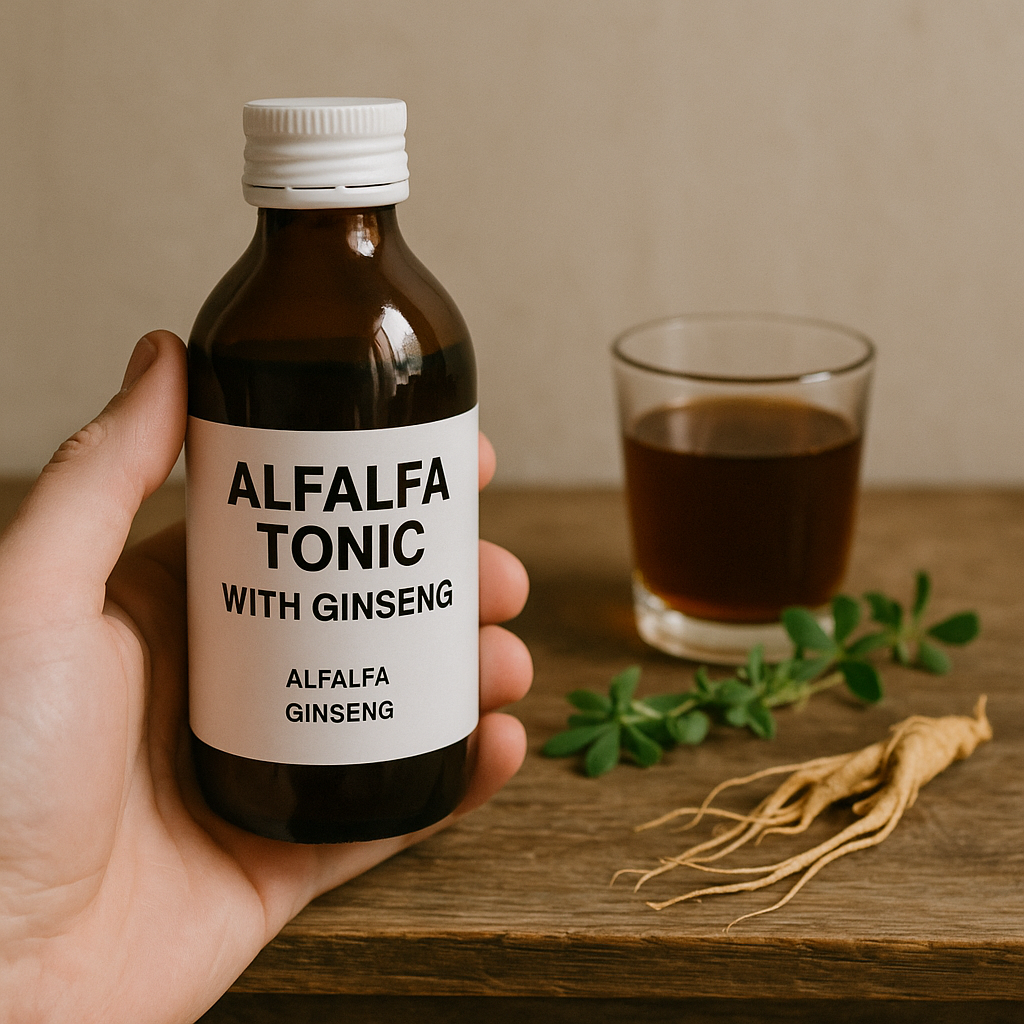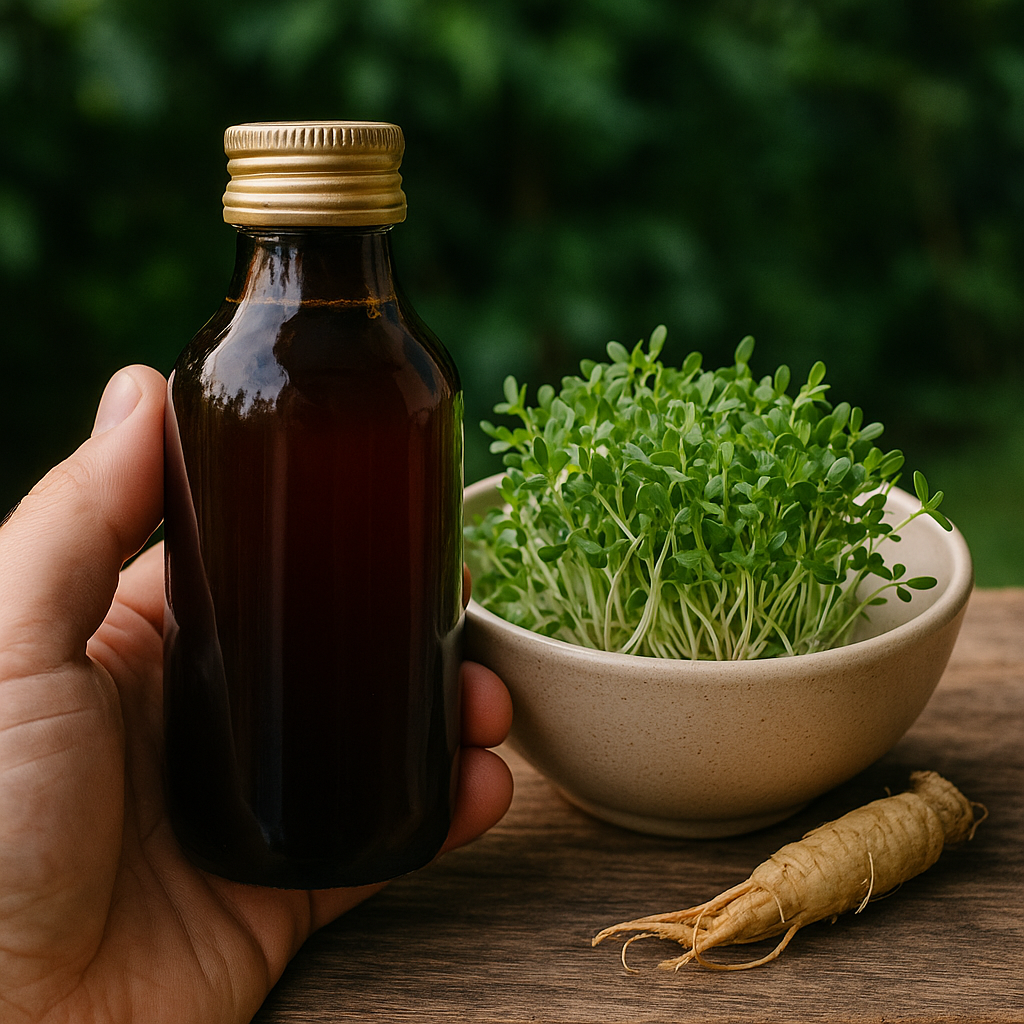If you're feeling drained, mentally foggy, or simply not your best lately, you’re definitely not alone. In today’s fast-paced world, our bodies are often playing catch-up with stress, poor nutrition, and lack of rest. That’s where alfalfa tonic with ginseng steps in — a herbal blend that's been gaining attention not just in homeopathy but across wellness communities for its natural yet powerful restorative properties.
Whether you’re curious about alfalfa tonic with ginseng uses, how it’s taken, or what makes this formula so effective, you’re in the right place. We’ll unpack everything — from ingredients to dosages, from who should use it to real-world benefits. Spoiler alert: it’s not just about boosting energy (though it does that pretty well too). Let’s dig in.
What Is Alfalfa Tonic with Ginseng and What It Contains
At first glance, it might sound like something out of an old apothecary book. But alfalfa tonic with ginseng is a very modern answer to a variety of health complaints. It’s a nutritional and herbal supplement made primarily from the alfalfa plant, enriched with ginseng and other synergistic ingredients. Designed to support overall vitality, the tonic often comes in liquid form and is available through several homeopathic and herbal medicine brands.
SBL Homeopathy Alfalfa Tonic Overview
One of the most well-known versions of this tonic is the SBL homeopathy alfalfa tonic with ginseng. SBL (Schwabe India) is a reputed name in homeopathy, and their formulation of alfalfa tonic includes a blend of key herbs, minerals, and homeopathic components. The ginseng added here isn't just a filler — it’s included for its proven adaptogenic properties, helping your body cope better with physical, emotional, and even mental stress.
In this formulation, SBL combines Medicago sativa (that's alfalfa), Ginseng, Cinchona officinalis, Kalium phosphoricum, and other key minerals to create a tonic that addresses multiple systems in the body. It's often marketed as a "restorative tonic" for those dealing with weakness, nervous exhaustion, or lack of appetite.
Herbal Ingredients and How They Work Together
Alfalfa itself is a nutritional powerhouse. It contains vitamins A, C, E, and K, along with essential minerals like calcium and iron. But what makes alfalfa ginseng tonic uses stand out is the synergy between its ingredients:
-
Ginseng: An adaptogen that improves energy, stamina, and stress tolerance. It helps balance cortisol levels and can improve mental clarity.
-
Alfalfa: Rich in phytonutrients, it supports digestion, detoxification, and overall nourishment.
-
Cinchona: Traditionally used to treat weakness and stimulate appetite.
-
Kalium Phosphoricum: A homeopathic remedy used for nervous fatigue, memory issues, and irritability.
Together, these ingredients create a tonic that doesn’t just mask symptoms — it works to restore balance. It's kinda like giving your whole system a much-needed tune-up.
Also, let’s be honest: the taste? Not everyone loves it. Some find it a bit bitter or grassy (especially the non-flavored versions), but the results often make up for that. And you do get used to it, promise. 😉

Alfalfa Ginseng Tonic Uses and Benefits in Daily Life
Now that we know what’s inside alfalfa tonic with ginseng, let’s talk about what it actually does for you. You’re probably wondering if it’s just another overhyped supplement or something that can make a real difference. Well, let’s break it down — and keep it real.
Energy Boost, Appetite Stimulation, and Stress Recovery
First up, the energy thing? It’s real.
One of the biggest alfalfa ginseng tonic benefits people notice is a noticeable lift in energy levels — not the jittery, caffeine-induced kind, but a more stable, all-day vitality. This is especially helpful for folks who feel like they’re running on empty despite sleeping enough (or trying to). Ginseng helps here, by improving mitochondrial energy production and reducing fatigue, especially in people recovering from illness or long-term stress.
But energy isn’t the only perk. The tonic also works wonders on the digestive system. If you or someone you know struggles with a poor appetite (kids especially), alfalfa tonic with ginseng uses often include appetite stimulation and better nutrient absorption. Alfalfa promotes natural digestion while ginseng helps support your metabolism. The result? You actually feel hungry, and your body makes better use of what you eat.
Stress recovery is another underrated benefit. Modern life is a beast, let’s not sugarcoat it. The tonic’s combination of adaptogenic and nervine herbs — especially ginseng and kalium phosphoricum — supports your body’s stress response, helping you calm down faster and bounce back stronger. Mental fog, irritability, and even light insomnia? Many people report improvements within a week or two of regular use.
A word of caution here: it's not magic. It’s still important to eat well, rest enough, and stay active. The tonic works with you, not instead of you.
Who Should Use Alfalfa Tonic and Why
So who’s this for, exactly? Honestly, a pretty wide range of people.
-
Students dealing with academic stress or struggling to focus.
-
Professionals experiencing burnout or fatigue after long workdays.
-
Recovering patients who’ve lost weight, appetite, or energy due to illness or surgery.
-
Parents of picky eaters looking for a way to gently stimulate their child’s appetite.
-
Seniors needing overall vitality and nourishment.
Even athletes sometimes take it to recover from intense training periods. Just keep in mind that alfalfa tonic with ginseng how to use will depend on age and health condition — more on that in the next section.
It’s not suitable for everyone, though. People with hormone-sensitive conditions or those on certain medications should definitely consult a doctor before trying it. And if you're allergic to any of the ingredients (ginseng allergies are rare, but they do exist), better stay on the safe side.
Also... random side note: a friend of mine swears by this stuff to survive Monday mornings. Not saying it’s a miracle, but hey — small wins, right?

How to Use Alfalfa Tonic with Ginseng Safely and Effectively
Knowing the benefits is one thing. Actually using the tonic properly? That’s where a lot of people get tripped up. Let's get this sorted so you can start seeing results without running into weird side effects or wasting your time.
Recommended Dosage for Adults and Children
The dosage can vary slightly depending on the brand, but generally, for SBL homeopathy alfalfa tonic with ginseng, the standard dose is:
-
Adults: 1 tablespoon (about 10–15 ml), three times a day before meals.
-
Children: Half a tablespoon or as directed by a homeopathic practitioner.
For very young kids or babies, don’t try to guess it — always ask a doctor first. It’s also available in syrup and drops, and some versions even come with added vitamins. Just double-check the alfalfa tonic with ginseng details on the label before starting.
And hey, consistency matters. Taking it once a week and expecting miracles isn’t gonna cut it. Stick with it daily for at least 2–4 weeks to notice changes.
When to Take It and Possible Precautions
Timing-wise, it's best taken before meals. That way it helps stimulate appetite and supports digestion. Some folks do take it after meals too, especially if they’re using it for energy. Honestly, either way works — just don't skip doses randomly.
A few precautions though:
-
Pregnant or breastfeeding women should check with their doctor first.
-
If you're on blood pressure meds, blood thinners, or have hormone-sensitive conditions (like certain cancers or thyroid issues), again — talk to a medical professional.
-
Also, store it in a cool, dry place and keep it out of reach of kids. Basic but easy to forget.
One small note: some users report mild bloating or gas when they first start it. This usually settles down in a few days. But if anything feels “off,” better safe than sorry — stop and consult someone who knows what they’re doing.
Conclusion
So there you have it — a full breakdown of alfalfa tonic with ginseng how to use, its benefits, and what makes it such a buzz-worthy herbal supplement. From appetite support and energy revival to managing stress and aiding recovery, this tonic is a pretty well-rounded tool in your health kit.
While it’s not a magic potion, it is one of those rare things in wellness that’s stood the test of time and still makes sense today. Whether you're running on empty or just want to feel a bit more like yourself again, giving alfalfa ginseng tonic a try might just be the pick-me-up your body's been quietly asking for.
And hey — if you found this guide helpful, share it with someone who might need it. Good health is better when passed on. 🙂
Ready to try it for yourself? Look for SBL homeopathy alfalfa tonic with ginseng at your local pharmacy or online store. And if you’ve used it before, share your experience in the comments or pass this guide to someone who could benefit. Let’s spread better health — one tonic at a time.
FAQs
Why is ginseng used?
Ginseng is used for its adaptogenic properties — meaning it helps your body resist stress and fatigue. It’s also known to boost energy, improve mental clarity, and support immune function.
Can I take alfalfa everyday?
Yes, you can take alfalfa daily — especially in tonic form. It’s usually safe for most people when taken as directed, but always watch out for allergies or interactions with medications.
Is alfalfa tonic multivitamin?
Technically, no — it’s not a multivitamin in the strict sense. But it does contain a rich mix of vitamins and minerals from natural sources, making it a pretty nutrient-dense option.




